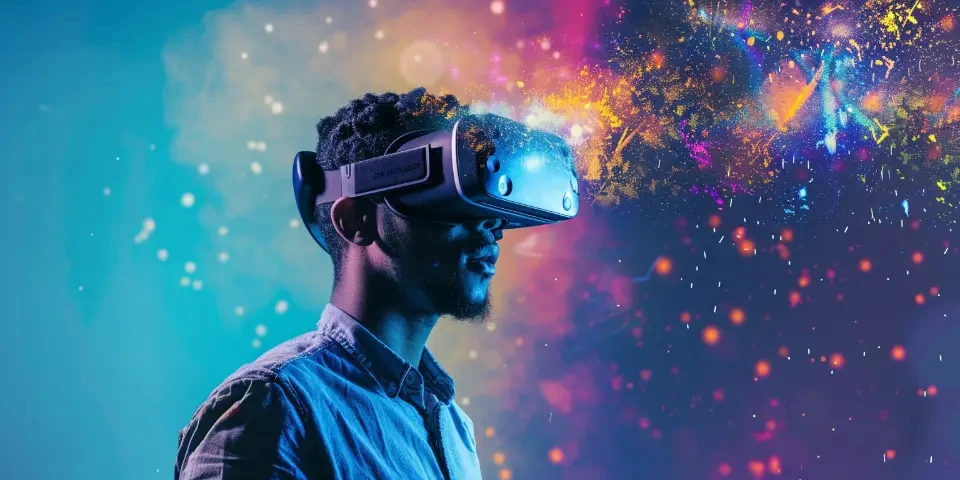AI in Entertainment Enhancing Immersive Experiences through Virtual Reality
In recent years, the convergence of Artificial Intelligence (AI) and Virtual Reality (VR) technologies has revolutionized the entertainment industry. AI has greatly enhanced immersive experiences, making them more engaging, interactive, and personalized. This article explores the various ways in which AI is transforming entertainment through virtual reality, bringing a new level of excitement and realism to our favorite games, movies, and interactive experiences.
1. Intelligent Character Behavior
AI algorithms can create intelligent, lifelike characters in virtual reality environments. These characters can exhibit realistic behaviors, emotions, and responses, enhancing the overall immersive experience. By analyzing user interactions and adapting to different scenarios, AI can tailor character behavior to provide a personalized and dynamic narrative.

AI-powered character behavior has been utilized in popular VR games like "The Elder Scrolls V: Skyrim VR" and "Fallout 4 VR," where non-player characters (NPCs) react intelligently to the player's actions, making the virtual world feel more realistic and immersive.
2. Gesture and Speech Recognition
Virtual Reality often involves the use of controllers or sensors to interact with the virtual environment. AI-powered gesture and speech recognition technologies enable more natural and intuitive interactions.
Leading AI-assisted tools like Microsoft's Azure Kinect and Google's Project Soli can accurately detect and interpret gestures, enabling users to control virtual objects or characters simply through hand movements. Speech recognition allows users to interact with virtual environments using voice commands, further enhancing the immersion and eliminating the need for physical controllers.
3. Personalized Content Recommendations
AI algorithms can analyze user preferences, behavior, and previous interactions to provide personalized content recommendations in virtual reality. This helps users discover new movies, games, and experiences that align with their interests, ultimately enhancing their entertainment experience.
Platforms like Netflix and Hulu already leverage AI to provide personalized movie and TV show recommendations. Integrating AI with VR headsets can open up a whole new level of personalized content curation, ensuring that users are served with immersive experiences tailored to their tastes.
4. Realistic Environments and Physics
AI algorithms, combined with powerful computing capabilities, can generate realistic virtual environments and simulate complex physics. This creates a more believable and immersive experience for users.
Tools like NVIDIA's Omniverse and Unreal Engine's Chaos physics system provide developers with AI-driven simulation capabilities, enabling the creation of stunning and physically accurate virtual worlds. Users can interact with objects and experience realistic reactions, such as gravity, collisions, and fluid dynamics, further enhancing the immersion.
5. Intelligent Storytelling
AI can optimize storytelling in virtual reality by dynamically adapting the narrative to user interactions. By analyzing user behavior and preferences in real-time, AI algorithms can adjust the storyline, pacing, and outcomes to create a more engaging and personalized experience.
Interactive storytelling platforms like Fable Studio's "Wolves in the Walls" leverage AI to offer immersive narratives that adapt and respond to user choices, making the story feel more alive and interactive. This opens up new possibilities for immersive storytelling in virtual reality.
6. AI-Powered Virtual Assistants
Virtual reality experiences can be enhanced by AI-powered virtual assistants that provide contextual information, guidance, or help during gameplay or exploration. These assistants can understand natural language and respond intelligently, enhancing the overall immersion and gameplay experience.
Virtual assistants like Amazon's Alexa or Google Assistant can be integrated into VR environments to provide real-time information, tips, or even assist with in-game challenges. Their integration with AI and VR enables users to have more interactive and dynamic experiences.
7. Facial Expression and Emotion Recognition
AI technologies are now capable of tracking and interpreting users' facial expressions and emotions through cameras and sensors. In virtual reality, this capability can be leveraged to create more immersive and realistic social interactions between players and characters.
Startups like Emteq and Proximie are developing AI-powered software and systems that enable emotion recognition in VR. By capturing and analyzing facial expressions, developers can create more emotionally intelligent characters, enhancing the overall immersive and social aspects of virtual reality experiences.
8. AI-Generated Music and Soundscapes
AI algorithms can analyze user preferences and generate personalized music and soundscapes to accompany virtual reality experiences. By understanding the mood, context, and user preferences, AI can create unique soundtracks that enhance immersion and evoke emotional responses.
Tools like Jukedeck and Amper Music leverage AI to generate music tracks customized to specific requirements. Integrating these systems with virtual reality applications can result in dynamic and adaptive soundtracks, elevating the immersive experience to new heights.
Frequently Asked Questions (FAQs):
Q1: How does AI enhance the gaming experience in virtual reality?
AI enhances the gaming experience in virtual reality by: creating intelligent character behavior, enabling natural gestural and speech interactions, personalizing content recommendations, and simulating realistic environments and physics. AI also optimizes storytelling, integrates virtual assistants, utilizes facial expression and emotion recognition, and generates personalized soundscapes.
Q2: Can AI in virtual reality be used for educational purposes?
Yes, AI in virtual reality can be used for educational purposes. AI-powered virtual reality applications can provide immersive and interactive educational experiences, allowing students to explore historical sites, perform virtual experiments, or practice real-life simulations in a safe and controlled environment.
Q3: Are there any significant challenges to implementing AI in virtual reality?
Yes, there are challenges to implementing AI in virtual reality. Some key challenges include creating lifelike character behavior, accurately interpreting natural gestures and speech, ensuring privacy and data security, and developing algorithms that adapt in real-time to user interactions. Overcoming these challenges requires ongoing research and development.
References:
1. Gielniak, M. J., and Graichen, S. (2019). Artificial Intelligence in Virtual Reality: State of the Art and Future Directions. Frontiers in Robotics and AI, 6, 111.
2. H?rtl, A., and G?bel, S. (2017). AI and Games for More Dynamic and Immersive Experiences. ACM International Conference on Interactive Experiences for TV and Online Video, 243-248.
3. Takahashi, D. (2020). Microsoft’s Azure Kinect AI and depth cameras are now available in retail stores. VentureBeat. Retrieved from https://venturebeat.com/2020/02/24/microsofts-azure-kinect-ai-and-depth-cameras-are-now-available-in-retail-stores/
Explore your companion in WeMate